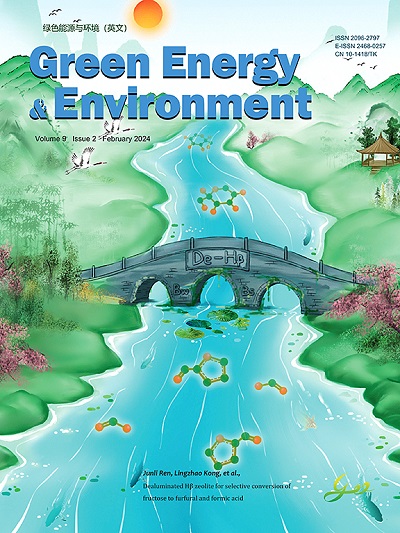Optimizing Electronic Structure through Point Defect Engineering for Enhanced Electrocatalytic Energy Conversion
IF 10.7
1区 工程技术
Q1 CHEMISTRY, PHYSICAL
引用次数: 0
Abstract
Point defect engineering endows catalysts with novel physical and chemical properties, elevating their electrocatalytic efficiency. The introduction of defects emerges as a promising strategy, effectively modifying the electronic structure of active sites. This optimization influences the adsorption energy of intermediates, thereby mitigating reaction energy barriers, altering paths, enhancing selectivity, and ultimately improving the catalytic efficiency of electrocatalysts. To elucidate the impact of defects on the electrocatalytic process, we comprehensively outline the roles of various point defects, their synthetic methodologies, and characterization techniques. Importantly, we consolidate insights into the relationship between point defects and catalytic activity for hydrogen/oxygen evolution and CO/O/N reduction reactions by integrating mechanisms from diverse reactions. This underscores the pivotal role of point defects in enhancing catalytic performance. At last, the principal challenges and prospects associated with point defects in current electrocatalysts are proposed, emphasizing their role in advancing the efficiency of electrochemical energy storage and conversion materials.通过点缺陷工程优化电子结构,提高电催化能量转换能力
点缺陷工程赋予催化剂新颖的物理和化学特性,从而提高其电催化效率。引入缺陷是一种很有前途的策略,可有效改变活性位点的电子结构。这种优化会影响中间产物的吸附能,从而减轻反应能量障碍、改变路径、提高选择性,并最终提高电催化剂的催化效率。为了阐明缺陷对电催化过程的影响,我们全面概述了各种点缺陷的作用、合成方法和表征技术。重要的是,我们通过整合不同反应的机理,对点缺陷与氢/氧进化和 CO/O/N 还原反应催化活性之间的关系进行了深入分析。这强调了点缺陷在提高催化性能方面的关键作用。最后,提出了当前电催化剂中与点缺陷相关的主要挑战和前景,强调了点缺陷在提高电化学储能和转换材料效率方面的作用。
本文章由计算机程序翻译,如有差异,请以英文原文为准。
求助全文
约1分钟内获得全文
求助全文
来源期刊

Green Energy & Environment
Energy-Renewable Energy, Sustainability and the Environment
CiteScore
16.80
自引率
3.80%
发文量
332
审稿时长
12 days
期刊介绍:
Green Energy & Environment (GEE) is an internationally recognized journal that undergoes a rigorous peer-review process. It focuses on interdisciplinary research related to green energy and the environment, covering a wide range of topics including biofuel and bioenergy, energy storage and networks, catalysis for sustainable processes, and materials for energy and the environment. GEE has a broad scope and encourages the submission of original and innovative research in both fundamental and engineering fields. Additionally, GEE serves as a platform for discussions, summaries, reviews, and previews of the impact of green energy on the eco-environment.
 求助内容:
求助内容: 应助结果提醒方式:
应助结果提醒方式:


